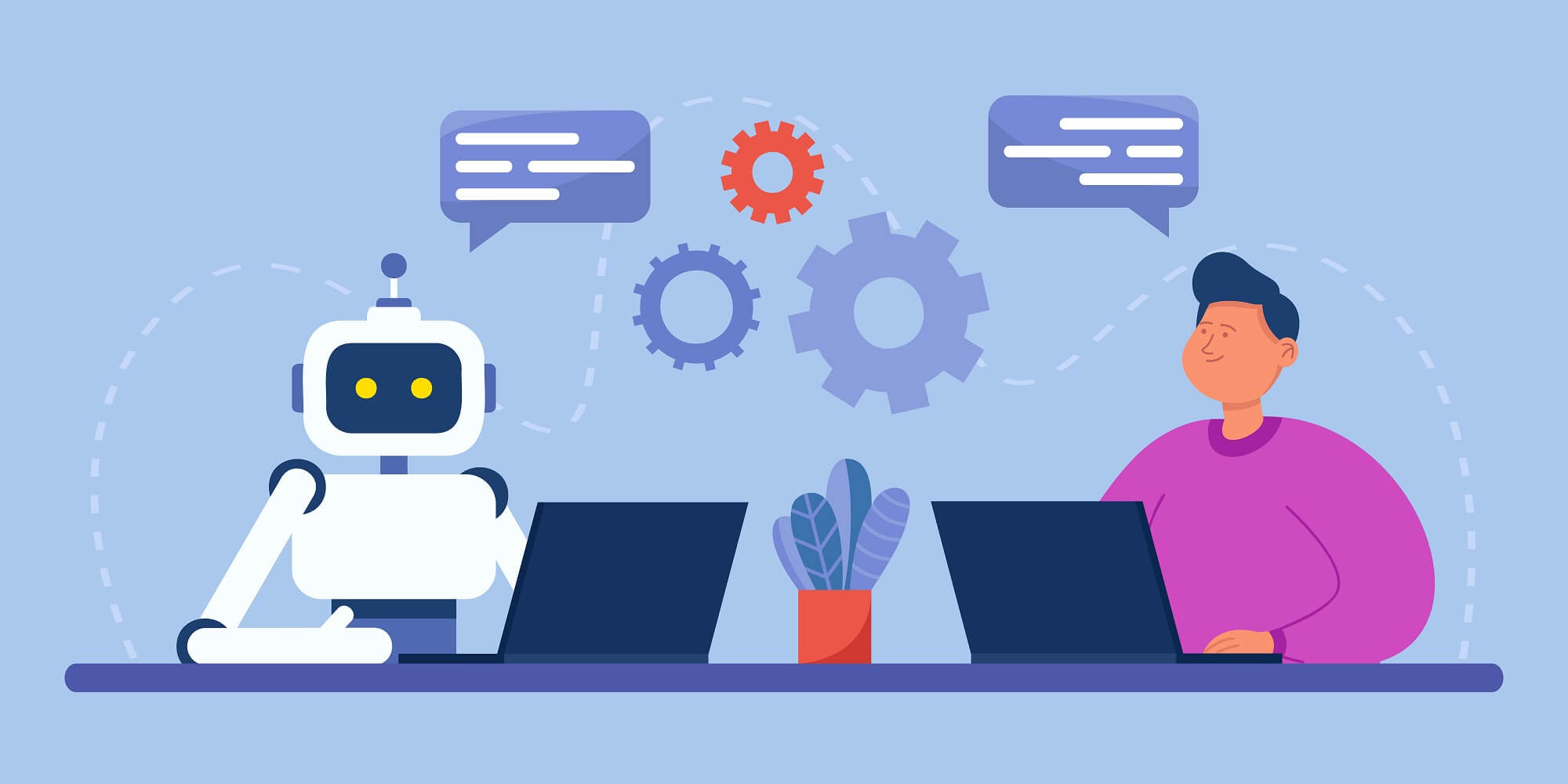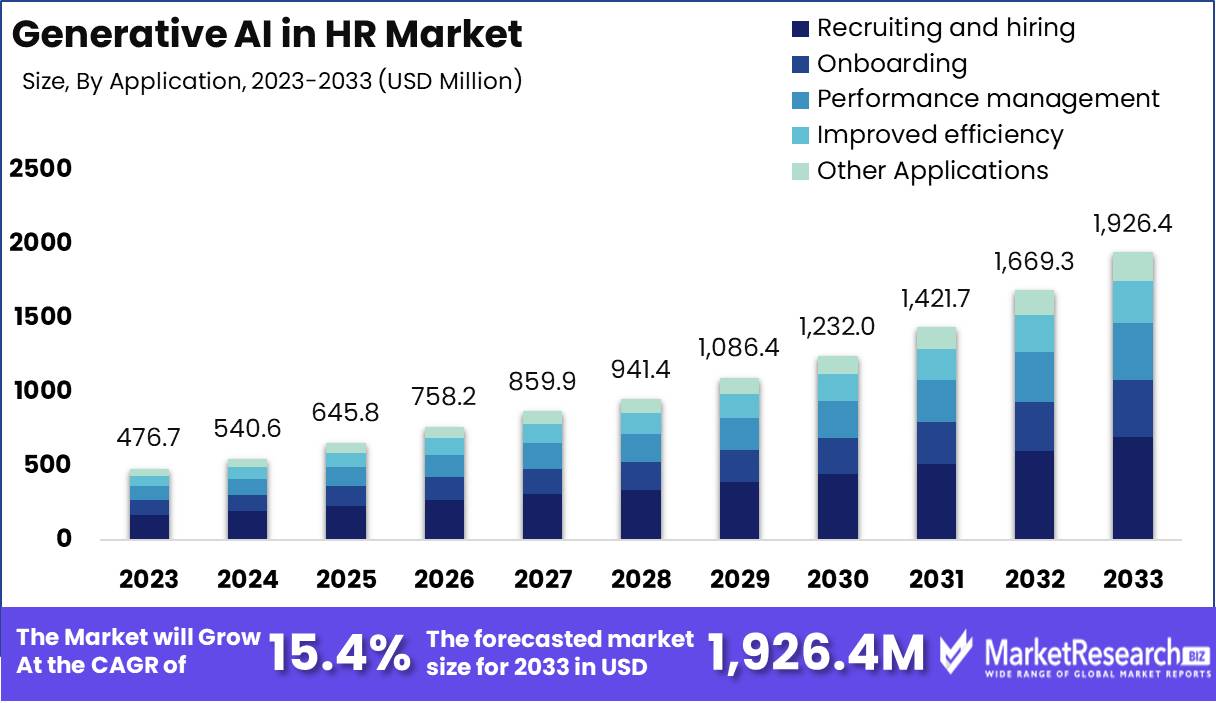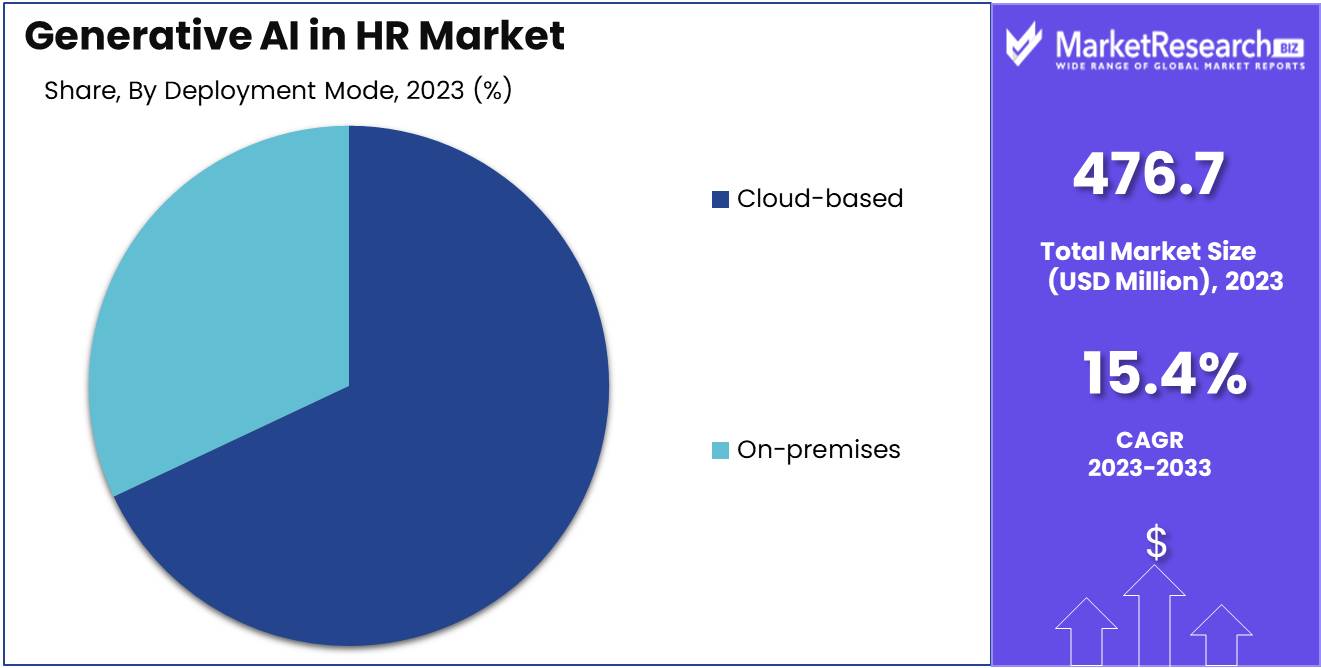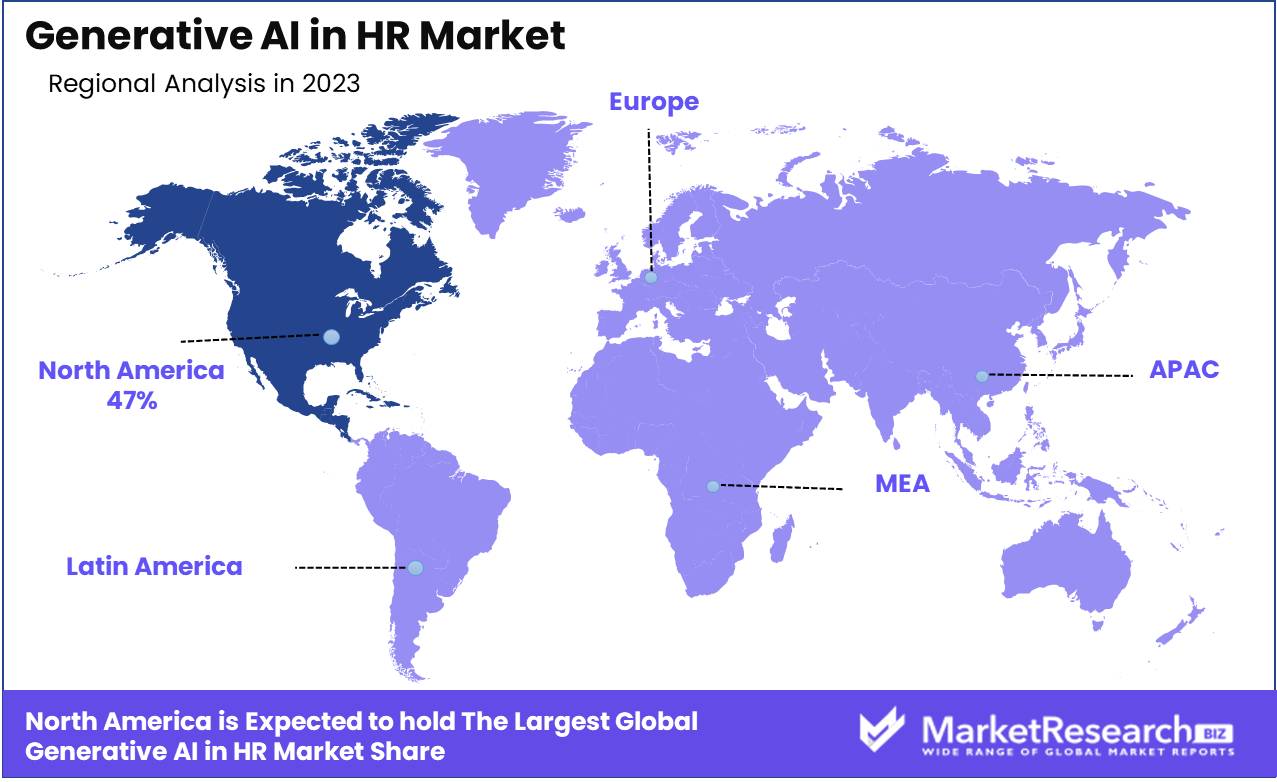
Global Generative AI in HR Market by Application (Recruiting and Hiring, Onboarding,and Others ), By Deployment Mode (Cloud-based and On-premises), By Technology (Machine learning, Natural Language Processing, and Others ), By Region and Companies - Industry Segment Outlook, Market Assessment, Competition Scenario, Trends, and Forecast 2024-2033
-
36842
-
April 2024
-
300
-
-
This report was compiled by Vishwa Gaul Vishwa is an experienced market research and consulting professional with over 8 years of expertise in the ICT industry, contributing to over 700 reports across telecommunications, software, hardware, and digital solutions. Correspondence Team Lead- ICT Linkedin | Detailed Market research Methodology Our methodology involves a mix of primary research, including interviews with leading mental health experts, and secondary research from reputable medical journals and databases. View Detailed Methodology Page
-
Quick Navigation
Report Overview
Generative AI in HR Market size is expected to be worth around USD 1,926.4 Mn by 2033 from USD 476.7 Mn in 2023, growing at a CAGR of 15.4%. during the forecast period from 2024 to 2033.
The surge in demand for new advanced technologies and maximizing the workforce are some of the main key driving factors for generative artificial intelligence in the HR market. Generative AI is a subset of artificial intelligence that helps in analyzing data and making decisions without any interference from humans. Either it uses ML or natural language processing which is also known as NLP to train machines to simulate human intelligence. GenAI in human resources comprises automating manual, monotonous functions to provide some spare time for HR departments. With all the required parameters and the organization’s benchmark information, GenAI can accelerate in finishing high volume functions which might take weeks to process by the HR department.

The implementation of GenAI in the HR sector provides several important and compelling potentialities. Various teams are using virtual assistants such as chatbots and experimenting with GenAI in recruiting and deployment that brings efficacy and new insights to the individual’s function. HR’s integration with GenAI is all set to transform the overall HR functionalities. Generative AI is used to automate tasks such as payrolls and other admin work. It also helps in rapidly developing new policies, contracts, job descriptions, and interview questions.
The integration of GenAI in the Human resource sector provides new solutions that can refine the HR domain. AI-driven chatbots and virtual assistants have become an important part of HR operations. It has the potential to enhance HR practices in many ways and it acts as the reagents for bringing a positive change in the domain. With the help of GenAI, all types of repetitive and time-consuming tasks can be done automatically. Such type of automation unshackles HR experts from overwork tasks and permits them to pass on their efforts towards more productive work that also helps in maintaining the quality of any task. According to a report published by Study in 2023, highlights that 76% of HR professionals believe that if the company does not adopt GenAI in the workplace, the productivity of work will be lagging behind in the next 12 to 14 months which will impact the organizational success.
There are several ways where GenAI can be beneficial for the HR professional such as it helps in the recruiting process, performance review, onboarding/offboarding process of employees, talent development and training, and workforce planning. This technology also provides 24x7 virtual assistance that will resolve any queries related to HR policies to their employees. The demand for GenAI in HR will increase due to its requirement in the HR workplace which will help in market expansion during the forecasted period.
Key Takeaways
- Market Value: Generative AI in HR Market size is expected to be worth around USD 1,926.4 Mn by 2033 from USD 476.7 Mn in 2023, growing at a CAGR of 15.4% during the forecast period from 2024 to 2033.
- Based on Application: Generative AI streamlines 28% of HR processes in recruiting and hiring.
- Based on Deployment Mode: Cloud-based generative AI dominates the HR market with a 68% share.
- Based on Technology: Machine learning powers generative AI innovations in the HR market.
- Regional Analysis: Generative AI holds a 47% market share in North America's HR sector.
- Growth Opportunity: In 2023, the application of generative AI in HR operations will offer significant opportunities for enhancing efficiency through automation of administrative tasks and increasing flexibility with customizable, scalable solutions that adapt to organizational needs.
Driving factors
Personalized Employee Experiences Driving Engagement and Retention
Generative AI is transforming HR by personalizing the employee experience, thereby meeting the evolving expectations of the workforce. This technology enables HR departments to tailor interactions and processes to the individual needs and preferences of employees, enhancing engagement and job satisfaction. For instance, AI-driven platforms can suggest customized training programs and career development paths, which are crucial for employee retention and motivation.
By leveraging data on employee behaviors and preferences, these AI systems help create a more supportive and responsive work environment. The net effect is a workplace where employees feel valued and understood, which is instrumental in boosting both employee retention and attraction in a competitive talent market.
Boosting Workforce Productivity through AI Efficiency
Generative AI significantly enhances workforce productivity by streamlining complex processes and reducing the time employees spend on administrative tasks. AI applications in HR automate routine tasks such as payroll processing, benefits administration, and compliance reporting. This automation frees up HR professionals to focus on more strategic initiatives like talent management and workforce planning.
Moreover, AI tools provide employees with quick and easy access to HR services, such as FAQs and self-service portals, reducing downtime and improving efficiency. By simplifying interactions and minimizing system complexity, generative AI is a key player in enhancing the productivity of the workforce, ultimately contributing to the organization's bottom line.
AI as a Strategic Solver of HR Business Challenges
Generative AI plays a pivotal role in solving complex business challenges within HR by offering scalable insights and innovative services. This technology aids in crucial areas such as resource allocation and strategic financial planning by predicting future staffing needs and identifying cost-saving opportunities.
For example, AI-driven analytics can forecast hiring trends and pinpoint inefficiencies in workforce utilization. By providing these insights at scale, generative AI empowers HR leaders to make informed decisions that align with both immediate needs and long-term strategic goals. This capability not only improves operational efficiency but also enhances the strategic positioning of HR within the organization, making it a central pillar in driving business success.
Restraining Factors
Navigating the Complexity Gap in Generative AI Applications
One significant restraint in the adoption of generative AI within HR is the limited understanding that these models have of complex HR processes. HR involves intricate, often subjective decision-making that relies heavily on human judgment, understanding, and empathy—qualities that AI has yet to fully replicate.
When generative AI fails to comprehend these subtleties, it can lead to recommendations that are not only inaccurate but potentially inappropriate. For example, AI might misinterpret the context or sentiment behind employee feedback, leading to flawed conclusions and actions. This gap between AI capabilities and the nuanced demands of HR processes can hinder the reliability and effectiveness of AI solutions, slowing their adoption and integration within core HR functions.
Building Trust in AI-Driven HR Solutions
The successful integration of generative AI in HR is also heavily dependent on trust—both from HR professionals and employees. Skepticism arises particularly in scenarios where users do not fully understand how AI systems make decisions, or when there is a perceived lack of transparency and fairness in those decisions. Concerns about AI bias are particularly relevant, as HR decisions impact careers and livelihoods profoundly.
If AI systems make decisions that seem biased or unfair, it can lead to significant resistance from users. Building trust requires transparent AI processes, clear communication about how AI decisions are made, and rigorous testing to ensure fairness and accuracy. Without addressing these trust issues, organizations may face challenges in achieving widespread acceptance and realizing the full potential of generative AI in HR.
By Application Analysis
Generative AI is transforming HR, now driving 28% of innovations in recruiting and hiring processes.
In 2023, the Generative AI in HR Market witnessed significant segmentation based on application, with "Recruiting and Hiring" leading the sector. This segment held a dominant market position, capturing more than a 28% share. This prominence is attributed to generative AI's transformative impact on the recruitment process, enhancing the efficiency and effectiveness of talent acquisition strategies.
Generative AI technologies in recruiting and hiring have revolutionized the way HR departments handle vast amounts of data, from sorting resumes to crafting personalized communication. These AI systems utilize advanced algorithms to predict candidate suitability, reduce hiring biases, and streamline the recruitment workflow, leading to considerable time and cost savings.
Following closely, the "Onboarding" segment utilized AI to personalize the integration of new employees into organizations, fostering a supportive and engaging work environment. "Performance Management" leveraged AI to provide real-time, data-driven insights into employee productivity and development needs, enhancing decision-making processes within HR functions.
The "Improved Efficiency" segment underscored generative AI’s role in automating routine tasks, thereby freeing up HR professionals to focus on more strategic initiatives that require human oversight. Finally, the "Other Applications" segment, which includes employee engagement and retention, training, and compensation management, also benefitted from AI's analytical and predictive capabilities, although these areas have seen slightly slower adoption rates compared to the core functions.
By Deployment Mode Analysis
Cloud-based generative AI dominates 68% of the HR market, enhancing recruitment efficiency and scalability.
In 2023, the Generative AI in the HR Market experienced pronounced segmentation based on the deployment mode, with "Cloud-based" solutions holding a dominant market position. This segment captured more than a 68% share, underscoring the widespread adoption of cloud technologies in human resources management.
Cloud-based deployment of generative AI tools in HR has become increasingly preferred due to its scalability, cost-effectiveness, and ease of integration. Organizations are leveraging cloud platforms to facilitate seamless access to AI capabilities without the significant upfront costs and maintenance concerns associated with on-premises solutions. This approach not only enhances the agility of HR operations but also supports remote working environments by providing ubiquitous access to AI-driven tools and data.
The ability of cloud-based generative AI solutions to provide updates and improvements continuously without disrupting the user experience contributes to their robust adoption. Furthermore, these solutions ensure enhanced data security measures, compliance with regulations, and improved collaboration across departments, which are critical factors for HR departments handling sensitive employee data.
Conversely, the "On-premises" deployment mode, while offering higher control over systems and data, involves greater capital expenditure and requires extensive IT support, which can be a deterrent for small to medium-sized enterprises. Despite these challenges, on-premises solutions continue to find relevance in industries where data residency and security are paramount.

By Technology Analysis
Machine learning powers generative AI, revolutionizing HR practices through predictive analytics and personalized solutions.
In 2023, the "Machine Learning" segment held a dominant market position in the "Based on the Technology" segment of the Generative AI in the HR Market. As a cornerstone of generative AI, machine learning (ML) technologies are pivotal in reshaping various HR functions, from recruitment to employee engagement and retention strategies.
Machine learning's ability to analyze vast datasets and extract meaningful patterns has proven invaluable in making predictive recommendations, enhancing decision-making processes, and automating routine tasks. In recruitment, for example, ML algorithms can sift through thousands of resumes to identify the most promising candidates based on criteria learned from historical hiring data. This not only speeds up the hiring process but also improves the quality of hiring by reducing human biases.
Following machine learning, other significant technologies within the Generative AI in the HR sector include Natural Language Processing (NLP), which is extensively used in chatbots and employee assistance programs. NLP helps in interpreting and responding to human language, providing a more interactive and responsive experience for employees.
Deep Learning and Computer Vision are utilized in more niche applications within HR, such as facial recognition for security purposes and analyzing video interviews to gauge candidate reactions and truthfulness. Lastly, Robotic Process Automation (RPA) finds its utility in streamlining HR processes such as payroll and benefits administration, further driving efficiency.
Key Market Segments
Based on the Application
- Recruiting and hiring
- Onboarding
- Performance management
- Improved efficiency
- Other Applications
Based on the Deployment Mode
- Cloud-based
- On-premises
Based on the Technology
- Machine learning
- Natural Language Processing
- Deep learning
- Computer vision
- Robotic Process Automation
Growth Opportunity
Streamlining HR Operations through Automation
In 2023, one of the most significant opportunities for generative AI in the HR market lies in the automation of administrative tasks. By deploying AI to handle repetitive and time-consuming activities like resume screening, candidate matching, and interview scheduling, HR departments can significantly enhance their operational efficiency.
This automation allows HR professionals to shift their focus from transactional tasks to more strategic aspects such as talent nurturing, employee engagement, and organizational development. As generative AI continues to mature, its ability to perform these tasks with high accuracy and minimal oversight will be a crucial driver for its adoption across diverse HR landscapes, thereby promoting growth in the global market.
Enhancing HR Flexibility with Customizable AI Solutions
Another promising avenue in 2023 is the customization and scalability of generative AI solutions. These technologies are not one-size-fits-all; they can be finely tuned to meet the specific needs of an organization. Whether it's adapting to fluctuating staffing requirements or integrating with unique HR systems, generative AI’s versatility makes it a valuable asset for any HR department.
This adaptability is particularly beneficial for organizations experiencing rapid growth or undergoing significant changes, as it ensures that their HR functions can scale efficiently without sacrificing performance. The ability to customize and scale AI solutions enables companies to maintain agility in their HR operations, positioning them to capitalize on emerging opportunities and navigate challenges effectively.
Latest Trends
Emphasizing Human-Machine Collaboration
A pivotal trend shaping generative AI in the HR landscape in 2023 is the focus on human-machine collaboration. Generative AI is increasingly viewed not as a replacement for human HR professionals but as a powerful tool that augments their capabilities. This synergy between human intuition and machine efficiency is key to driving innovation within HR departments.
By automating routine tasks, AI frees up HR professionals to focus on more complex, value-added activities that require human touch, such as employee relations and strategic decision-making. This collaboration is expected to enhance problem-solving and creativity, leading to more innovative HR practices and policies.
Advancing Career Development and Mobility
As generative AI reshapes job roles and tasks, there is a significant trend toward investing in career development and mobility to manage the transition for workers displaced by AI technologies. With a predicted market size of $16 billion within the next three years, companies are increasingly focusing on reskilling and upskilling employees. This investment is critical not only to mitigate the impact of job displacement due to AI but also to harness the full potential of human capital.
By providing training and development opportunities, organizations are preparing their workforce for new roles that complement AI capabilities, thereby ensuring a smoother integration of AI into the workplace and maintaining employee engagement and productivity.
Regional Analysis
The generative AI market in North American HR sectors commands a significant 47% market share.
In the dynamic landscape of the Generative AI market within the Human Resources sector, regional variations reflect distinct trends, adoption rates, and market maturity. North America emerges as the dominant region, holding a substantial 47% of the global market share. This leadership is primarily driven by the U.S., where advanced technological infrastructure and the presence of major AI firms foster innovation and early adoption of AI solutions in HR processes such as recruitment, onboarding, and employee management.
Europe follows, with significant investments in AI technologies influenced by stringent data protection regulations such as GDPR, which guide the deployment of AI in sensitive areas including personnel data handling. The market here is characterized by a strong focus on ethical AI applications, leading to cautious yet steady growth.
The Asia Pacific region is marked by a fast-paced expansion, driven by rapid economic development and digital transformation initiatives in countries like China, Japan, and India. These economies are leveraging generative AI to enhance HR functions and improve operational efficiencies in large-scale enterprises and growing startups alike, indicating a high growth potential in this region.
Meanwhile, the Middle East & Africa, and Latin America are nascent but promising markets for generative AI in HR. These regions exhibit growth spurred by digital modernization and an increasing awareness of AI benefits in business processes. Specifically, the UAE and Brazil are notable for their strategic investments in AI to boost economic sectors, including HR.

Key Regions and Countries
North America
- The US
- Canada
- Mexico
Western Europe
- Germany
- France
- The UK
- Spain
- Italy
- Portugal
- Ireland
- Austria
- Switzerland
- Benelux
- Nordic
- Rest of Western Europe
Eastern Europe
- Russia
- Poland
- The Czech Republic
- Greece
- Rest of Eastern Europe
APAC
- China
- Japan
- South Korea
- India
- Australia & New Zealand
- Indonesia
- Malaysia
- Philippines
- Singapore
- Thailand
- Vietnam
- Rest of APAC
Latin America
- Brazil
- Colombia
- Chile
- Argentina
- Costa Rica
- Rest of Latin America
Middle East & Africa
- Algeria
- Egypt
- Israel
- Kuwait
- Nigeria
- Saudi Arabia
- South Africa
- Turkey
- United Arab Emirates
- Rest of MEA
Key Players Analysis
In the evolving landscape of the global Generative AI in HR market for 2023, prominent key players including IBM Watson, Oracle, SAP SE, Workday Inc., ADP, and Cornerstone are pivotal in shaping the industry's trajectory. Each of these entities brings unique strengths and strategic focuses to the forefront, influencing not only market dynamics but also the technological adoption patterns across various regions.
IBM Watson continues to integrate AI deeply into HR functions, leveraging its advanced analytics and cognitive capabilities to enhance talent acquisition and employee management processes. The firm's focus on ethical AI and data security stands as a significant competitive advantage, particularly in industries where data sensitivity is paramount.
Oracle's strategy pivots around its extensive cloud services, offering robust AI-powered HR solutions that streamline operations from recruitment to retirement. The integration of AI into Oracle's cloud platforms enables more personalized and efficient employee experiences, potentially increasing user engagement and operational efficiency.
SAP SE capitalizes on its strong foothold in enterprise resource planning (ERP) to embed AI functionalities into core HR processes. By enhancing predictive analytics and decision-making tools, SAP SE aims to provide more strategic insights that support higher-level decision-making in HR departments.
Workday Inc., known for its innovative software solutions, emphasizes user-friendly AI tools that automate and optimize workforce planning and analytics. Its commitment to integrating AI seamlessly into existing HR workflows could drive higher adoption rates among enterprises seeking minimal disruption.
ADP and Cornerstone, while perhaps slightly smaller in scale compared to their aforementioned peers, focus on niche innovations like AI-driven payroll services (ADP) and continuous learning and development platforms (Cornerstone). These specialized offerings are crucial in addressing specific market needs and enhancing competitive positioning.
Market Key Players:
- IBM Watson
- Oracle
- SAP SE
- Workday Inc.
- ADP
- Cornerstone
- Other Key Players
Recent Developments
- In February 2024, ADP is integrating generative AI into its HR tools to enhance payroll validation and streamline processes, potentially transforming HR roles from administrative to more strategic, although the impact on productivity and staffing remains under evaluation by market analysts.
- In February 2024, Generative AI is set to revolutionize HR functions by enhancing efficiency, personalizing employee experiences, and enabling HR leaders to drive digital innovation and organizational change.
- In March 2024, A new report by Slack and Salesforce revealed that while 53% of Australian professionals are using or experimenting with generative AI at work, trust issues persist, particularly among women and lower job levels, despite high adoption rates among senior positions.
- In April 2024, Apax Partners is set to acquire HR and payroll software company Zellis from Bain Capital, positioning Zellis for long-term success with its extensive market footprint and advanced cloud-based offerings.
Report Scope
Report Features Description Market Value (2023) USD 476.7M Forecast Revenue (2033) USD 1,926.4M CAGR (2024-2032) 15.4% Base Year for Estimation 2023 Historic Period 2016-2023 Forecast Period 2024-2033 Report Coverage Revenue Forecast, Market Dynamics, COVID-19 Impact, Competitive Landscape, Recent Developments Segments Covered By Application (Recruiting and Hiring, onboarding, Performance management, Improved efficiency, and Other Applications), By Deployment Mode (Cloud-based, and On-premises), By Technology (Machine learning, Natural Language Processing, Deep learning, Computer vision, and Robotic Process Automation) Regional Analysis North America - The US, Canada, Rest of North America, Europe - Germany, France, The UK, Spain, Italy, Russia, Netherlands, Rest of Europe, Asia-Pacific - China, Japan, South Korea, India, New Zealand, Singapore, Thailand, Vietnam, Rest of Asia Pacific, Latin America - Brazil, Mexico, Rest of Latin America, Middle East & Africa - South Africa, Saudi Arabia, UAE, Rest of Middle East & Africa Competitive Landscape IBM Watson, Oracle, SAP SE, Workday Inc., ADP, Cornerstone, Other Key Players Customization Scope Customization for segments, region/country-level will be provided. Moreover, additional customization can be done based on the requirements. Purchase Options We have three licenses to opt for Single User License, Multi-User License (Up to 5 Users), Corporate Use License (Unlimited User and Printable PDF) Related Market Research Reports
- Generative AI in Customer Services Market
- Generative AI in Retail Market
- Generative AI in Education Market
- Generative AI in Insurance Market
- Generative AI in Supply Chain Market
- Generative AI in Pharma Market
- Generative AI in Travel Market
- Generative AI in Financial Services Market
- Generative AI in Higher Education Market
- Generative AI in Software Development Market
- Generative AI in Finance Market
- Generative AI in Manufacturing Market
- Generative AI in Sports Market
- Generative AI in Legal Market
- Generative AI in Jobs Market
- Generative AI in Sales Market
- Generative AI In Real Estate
- Generative AI in Accounting Market
- Generative AI in Cyber Security Market
- Generative AI in Procurement Market
- Generative AI in Logistics Market
- Generative ai in Security Market
- Generative AI in the Enterprise Market
- Generative AI in Banking Market
- Generative AI in Edtech Market
-
-
- IBM Watson
- Oracle
- SAP SE
- Workday Inc.
- ADP
- Cornerstone
- Other Key Players




